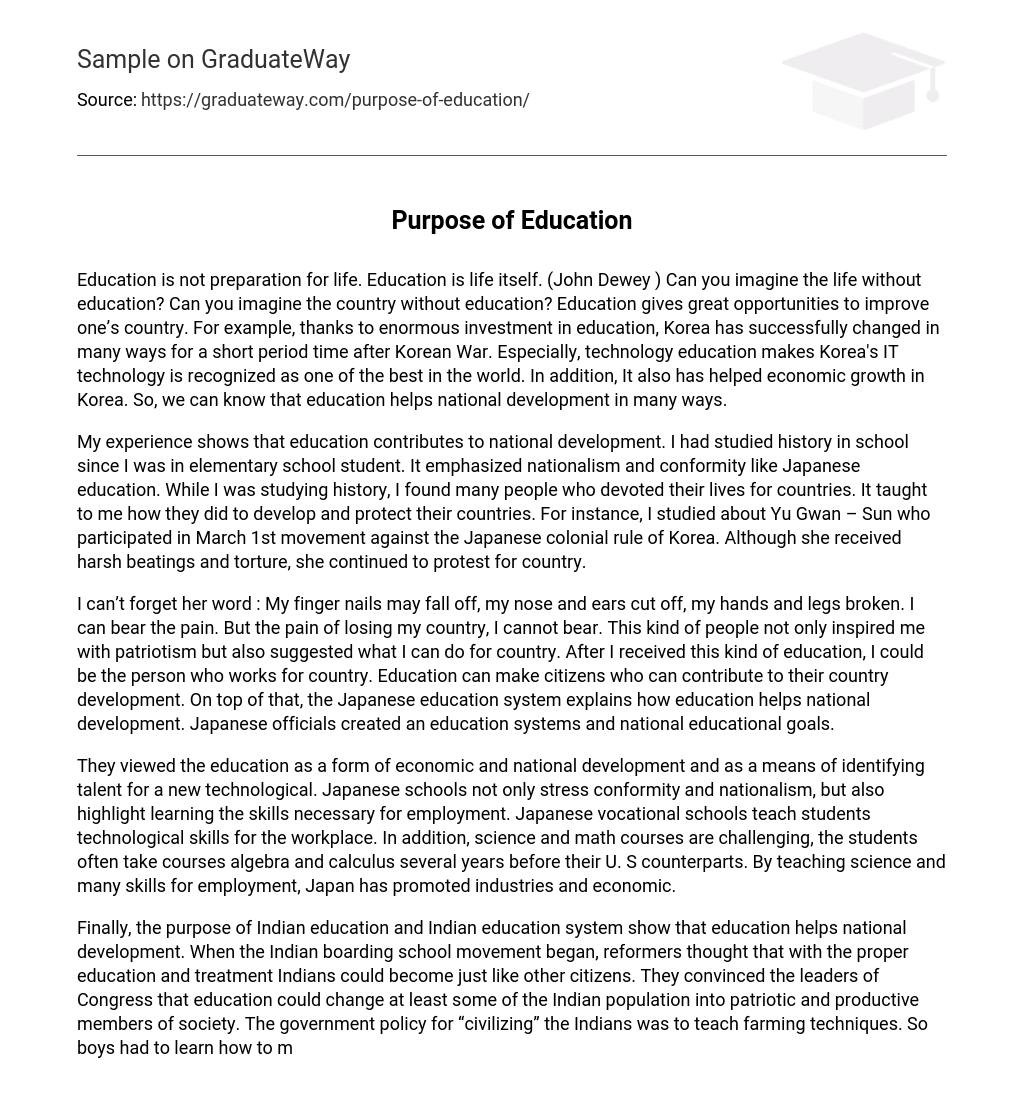John Dewey argued that education is not simply a preparation for life but an integral part of life itself. It is essential and unimaginable for both individuals and countries, offering extensive opportunities for national progress. The aftermath of the Korean War exemplifies the advantages gained from significant educational investments. Notably, Korea’s IT industry has attained worldwide recognition and become a leading global sector due to its focus on technology education. Additionally, education has played a vital role in driving Korea’s economic growth. Therefore, it is clear that education significantly contributes to a country’s development.
My experience demonstrates the impact of education on a nation’s progress. From elementary school onwards, I devoted myself to studying history, which aimed to cultivate patriotism and conformity, much like Japan’s educational system. During my exploration of history, I encountered many individuals who wholeheartedly served their countries and uncovered the strategies they utilized to advance and protect their nations. One remarkable individual is Yu Gwan-Sun, whom I extensively studied as she actively engaged in Korea’s March 1st movement against Japanese colonial rule. Despite enduring brutal beatings and torture, she fearlessly protested for her country.
Her words are unforgettable to me: “My fingernails may fall off, my nose and ears cut off, my hands and legs broken. I can bear the pain. But the pain of losing my country, I cannot bear.” These words not only ignite patriotism within me but also suggest ways in which I can serve my country.
Having been exposed to this form of education, I have transformed into an individual who is devoted to their nation. Education possesses the power to nurture individuals who can contribute to the advancement of their country.
The Japanese education system serves as a prime example of how education plays a pivotal role in national development. The officials in Japan have established educational systems and national educational objectives.
Japanese schools consider education essential for economic and national development as well as for spotting talent in the field of technology. They prioritize conformity, nationalism, and acquiring skills needed for employment. Japanese vocational schools focus on training students with technological skills required in the workplace. Moreover, science and mathematics courses are rigorous, with Japanese students often studying algebra and calculus several years before their counterparts in the United States. Through emphasizing science education and teaching various employment skills, Japan has effectively fostered industries and economic growth.
Ultimately, the aim of Indian education and its system demonstrates the role of education in facilitating national development. When the Indian boarding school initiative commenced, advocates believed that through adequate education and treatment, Indigenous people could assimilate into mainstream society. They successfully persuaded Congress leaders that education had the potential to transform a portion of the Indian population into loyal and industrious citizens. The primary objective of the government’s strategy to “civilize” Native Americans was to provide instruction in farming methods. As a result, boys were required to acquire skills such as milking cows, cultivating vegetables, and repairing tools.
The Indian education system placed emphasis on vocational training and the value of acquiring manual skills. The superintendent of schools believed that these practical skills were crucial for Indians to effectively contribute to agriculture. This educational focus not only benefited individuals but also played a significant role in national development. Like Japan, where education has led to economic and industrial growth, India’s education system has also contributed to its economic progress and the creation of valuable citizens. This example underscores the importance of education in a country’s development.





